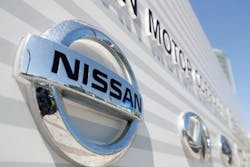Nissan Production Shutdown Delivers Fresh Blow to Japan Inc.
Nissan Motor Co. will suspend Japanese production of vehicles for local sale, marking a deepening of the carmaker’s quality-inspection debacle and delivering another blow to the nation’s scandal-plagued manufacturing industry.
Nissan will halt output for about two weeks at six plants that produce an average of 1,000 vehicles a day for the Japanese market, while it further investigates how unauthorized workers came to certify the quality of vehicles. The production of models for export will continue, the carmaker said at a briefing in Yokohama on Oct. 19.
The shutdown represents another headache for Chief Executive Officer Hiroto Saikawa, who took over from Carlos Ghosn just six months ago and has personally pledged to get to the bottom of the lapses. It comes as Japan Inc. is already reeling from a scandal at Kobe Steel Ltd., which said Oct. 8 it falsified data on the durability of some products -- an admission that’s reverberating through manufacturers of cars, planes and bullet trains.
“The existing management’s responsibility now is to prevent recurrence and to normalize operations and put the company back on a growth track,” said Saikawa, 63. “From my point of view if I see any mistakes, I’d like to take drastic measures. This is my job and I’m the one to lead it.”
Nissan previously said it would call back for inspection 1.16 million cars made and sold in Japan between January 2014 and September 2017, after the government found uncertified inspectors had approved vehicle quality at the domestic plants. The company had estimated those recalls would cost about 25 billion yen (US$222 million). Nissan said on Oct. 19 that an additional 34,000 vehicles produced between Sept. 20 to Oct. 18 will be reinspected, at a cost of an additional 1 billion yen.
Carlos Ghosn Protege Faces First Crisis With Nissan Recall
The company will reconfigure the inspection process, and plans to add additional final inspectors, Saikawa said. After the initial revelations, unauthorized inspections continued at four plants, Nissan said Thursday.
An external team probing the lapses found that some plants had transferred final vehicle checks to other lines. As a result, employees who were not internally registered as final vehicle inspectors performed the checks, causing the debacle, Nissan said. Vehicles exported from Japan aren’t involved in the recall because they don’t require the inspection certificate, Nissan has said.
“The communication gap between management and shop floors is big, bigger than what we imagined,” Saikawa said. He pledged on Oct. 2 to investigate the matter before deciding who should bear responsibility.
The Japanese auto industry has been reeling from multiple scandals involving product quality and falsification of records. In June, air bag maker Takata Corp. filed for bankruptcy after one of the world’s most famous recall crises. Last year, Suzuki Motor Corp. admitted to using unapproved fuel-economy testing methods in Japan, following similar disclosures by Mitsubishi Motors Corp., prompting greater scrutiny from the nation’s transport ministry. This month, Kobe Steel joined the list.
40-Year Veteran
Ghosn, a Brazilian-born French national, revived Boulogne-Billancourt, France-based Renault as executive vice president from 1996 to 1999. He then was assigned to turn around Nissan, where he reduced the company’s purchasing costs, shut five factories, eliminated 21,000 jobs and invested the savings back into 22 car and truck models in three years.
For Saikawa, the CEO job caps a four-decade career with Nissan, which he joined from Tokyo University. He served on the board of Renault, Nissan’s biggest shareholder, between 2006 and 2016, a period when the alliance came under pressure from the French state, which had increased its stake in Renault without informing Ghosn.
Saikawa led Nissan’s negotiations with Renault and the French government in 2015 to address an imbalance in the alliance’s ownership structure: the now more profitable Japanese partner had no voting rights for its stake in the French carmaker. A crisis was averted after the French state pledged not to interfere in Nissan’s governance.
By Ma Jie and Masatsugu Horie
About the Author
Bloomberg
Licensed content from Bloomberg, copyright 2016.
